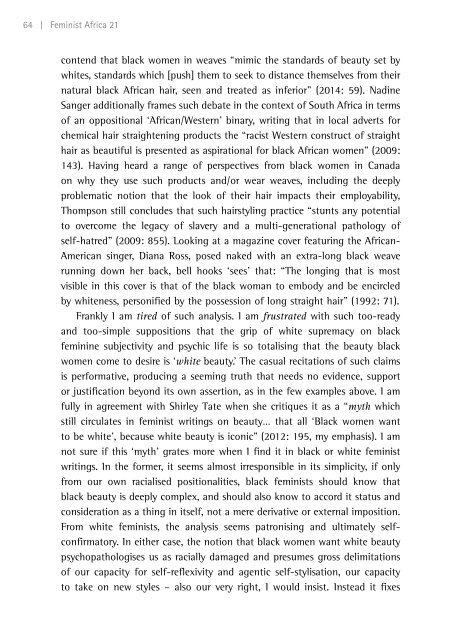The politics of fashion and beauty in Africa
fa21_proof_3
fa21_proof_3
Create successful ePaper yourself
Turn your PDF publications into a flip-book with our unique Google optimized e-Paper software.
64 | Fem<strong>in</strong>ist <strong>Africa</strong> 21<br />
contend that black women <strong>in</strong> weaves “mimic the st<strong>and</strong>ards <strong>of</strong> <strong>beauty</strong> set by<br />
whites, st<strong>and</strong>ards which [push] them to seek to distance themselves from their<br />
natural black <strong>Africa</strong>n hair, seen <strong>and</strong> treated as <strong>in</strong>ferior” (2014: 59). Nad<strong>in</strong>e<br />
Sanger additionally frames such debate <strong>in</strong> the context <strong>of</strong> South <strong>Africa</strong> <strong>in</strong> terms<br />
<strong>of</strong> an oppositional ‘<strong>Africa</strong>n/Western’ b<strong>in</strong>ary, writ<strong>in</strong>g that <strong>in</strong> local adverts for<br />
chemical hair straighten<strong>in</strong>g products the “racist Western construct <strong>of</strong> straight<br />
hair as beautiful is presented as aspirational for black <strong>Africa</strong>n women” (2009:<br />
143). Hav<strong>in</strong>g heard a range <strong>of</strong> perspectives from black women <strong>in</strong> Canada<br />
on why they use such products <strong>and</strong>/or wear weaves, <strong>in</strong>clud<strong>in</strong>g the deeply<br />
problematic notion that the look <strong>of</strong> their hair impacts their employability,<br />
Thompson still concludes that such hairstyl<strong>in</strong>g practice “stunts any potential<br />
to overcome the legacy <strong>of</strong> slavery <strong>and</strong> a multi-generational pathology <strong>of</strong><br />
self-hatred” (2009: 855). Look<strong>in</strong>g at a magaz<strong>in</strong>e cover featur<strong>in</strong>g the <strong>Africa</strong>n-<br />
American s<strong>in</strong>ger, Diana Ross, posed naked with an extra-long black weave<br />
runn<strong>in</strong>g down her back, bell hooks ‘sees’ that: “<strong>The</strong> long<strong>in</strong>g that is most<br />
visible <strong>in</strong> this cover is that <strong>of</strong> the black woman to embody <strong>and</strong> be encircled<br />
by whiteness, personified by the possession <strong>of</strong> long straight hair” (1992: 71).<br />
Frankly I am tired <strong>of</strong> such analysis. I am frustrated with such too-ready<br />
<strong>and</strong> too-simple suppositions that the grip <strong>of</strong> white supremacy on black<br />
fem<strong>in</strong><strong>in</strong>e subjectivity <strong>and</strong> psychic life is so totalis<strong>in</strong>g that the <strong>beauty</strong> black<br />
women come to desire is ‘white <strong>beauty</strong>.’ <strong>The</strong> casual recitations <strong>of</strong> such claims<br />
is performative, produc<strong>in</strong>g a seem<strong>in</strong>g truth that needs no evidence, support<br />
or justification beyond its own assertion, as <strong>in</strong> the few examples above. I am<br />
fully <strong>in</strong> agreement with Shirley Tate when she critiques it as a “myth which<br />
still circulates <strong>in</strong> fem<strong>in</strong>ist writ<strong>in</strong>gs on <strong>beauty</strong>… that all ‘Black women want<br />
to be white’, because white <strong>beauty</strong> is iconic” (2012: 195, my emphasis). I am<br />
not sure if this ‘myth’ grates more when I f<strong>in</strong>d it <strong>in</strong> black or white fem<strong>in</strong>ist<br />
writ<strong>in</strong>gs. In the former, it seems almost irresponsible <strong>in</strong> its simplicity, if only<br />
from our own racialised positionalities, black fem<strong>in</strong>ists should know that<br />
black <strong>beauty</strong> is deeply complex, <strong>and</strong> should also know to accord it status <strong>and</strong><br />
consideration as a th<strong>in</strong>g <strong>in</strong> itself, not a mere derivative or external imposition.<br />
From white fem<strong>in</strong>ists, the analysis seems patronis<strong>in</strong>g <strong>and</strong> ultimately selfconfirmatory.<br />
In either case, the notion that black women want white <strong>beauty</strong><br />
psychopathologises us as racially damaged <strong>and</strong> presumes gross delimitations<br />
<strong>of</strong> our capacity for self-reflexivity <strong>and</strong> agentic self-stylisation, our capacity<br />
to take on new styles – also our very right, I would <strong>in</strong>sist. Instead it fixes



